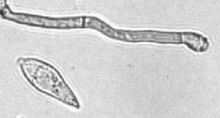Magnaporthales
| Magnaporthales | |
|---|---|

| |
| Magnaporthe grisea | |
| Scientific classification | |
| Domain: | Eukaryota |
| Kingdom: | Fungi |
| Division: | Ascomycota |
| Class: | Sordariomycetes |
| Subclass: | Diaporthomycetidae |
| Order: | Magnaporthales Thongk., Vijaykr. & K.D. Hyde 2009[1] |
| Families | |
| |
The Magnaporthales are an order of fungi within the class Sordariomycetes and subclass Diaporthomycetidae. It has several water based species and genera.
History
[edit]Family Magnaporthaceae was introduced by Cannon in 1994.[2] The placement of the taxa of family Magnaporthaceae had long been problematic due to the lack of convincing morphological and inconclusive molecular data studies (Thongkantha et al. 2009).[1] Then based on DNA phylogenies, Magnaporthaceae was placed as a family in the Sordariomycetes (Kirk et al. 2001,[3] Lumbsch & Huhndorf 2007,[4] Maharachchikumbura et al. 2016).[5] Thongkantha et al. (2009) established a new order, Magnaporthales to accommodate family Magnaporthaceae based on characters and phylogenetic analysis.[1] Then Maharachchikumbura et al. (2016) listed families Magnaporthaceae, Ophioceraceae, and Pyriculariaceae in order Magnaporthales based on the literature and phylogenetic analysis.[5] Pseudohalonectriaceae was introduced as a novel family in Magnaporthales to accommodate genus Pseudohalonectria based on phylogenetic and molecular dating evidence (Hongsanan et al. 2017).[6] The stem age of genus Pseudohalonectria falls within the range of family status (95 Mya (million years ago)) and it has high support in the phylogenetic and MCC trees (Genetic tree analysis). Silva et al. (2019) introduced a new genus Bifusisporella, in family Magnaporthaceae, to accommodate an endophytic fungus from Brazil, found on the healthy leaves of Sorghum bicolor.[7] The total divergence time for Magnaporthales is estimated as 190 MYA.[6] In the phylogenetic study by Luo et al. (2019), Ceratosphaeria species formed a distinct clade in Magnaporthales and so they introduced family Ceratosphaeriaceae to accommodate the genus Ceratosphaeria (and its 24 species).[8][9]
Wijayawardene et al. in 2020 accepted the families and genera in the order.[10]
References
[edit]- ^ a b c Thongkantha, Sutheera; Jeewon, Rajesh; Dhanasekaran, Vijaykrishna; Lumyong, Saisamorn; Mckenzie, Eric; Hyde, Kevin David (January 2009). "Molecular phylogeny of Magnaporthaceae (Sordariomycetes) with a new species, Ophioceras chiangdaoense from Dracaena loureiroi in Thailand". Fungal Diversity. 34: 157–173.
- ^ Cannon, P.F. (1994). "Observations on coevolution of the Phyllachoraceae (Fungi: Ascomycota) with the Leguminosae.". In Sprent, J.J.; McKey, D. (eds.). Advances in Legume Systematics vol. 5. The Nitrogen Factor. pp. 179–188.
- ^ Kirk, P.M.; Cannon, P.F.; David, J.C.; Stalpers, J.A. (2001). Ainsworth and Bisby's Dictionary of the Fungi (8 ed.). London: CABI Publishing.
- ^ Lumbsch, H.T.; Huhndorf, S.M. (2007). "Outline of Ascomycota 2007". Myconet. 13: 1–58.
- ^ a b Maharachchikumbura, Sajeewa S. N.; Hyde, Kevin D.; Jones, E. B. Gareth; McKenzie, E. H. C.; Bhat, Jayarama D.; Dayarathne, Monika C.; Huang, Shi-Ke; Norphanphoun, Chada; Senanayake, Indunil C. (2016-06-03). "Families of Sordariomycetes". Fungal Diversity. 79 (1): 1–317. doi:10.1007/s13225-016-0369-6. ISSN 1560-2745. S2CID 256070646.
- ^ a b Hongsanan, S.; Maharachchikumbura, S. S.; Hyde, Kevin D.; Samarakoon, M. C.; Jeewon, R.; Zhao, Q. (2017). "An updated phylogeny of sordariomycetes based on phylogenetic and molecular clock evidence". Fungal Divers. 84: 25–41. doi:10.1007/s13225-017-0384-2. S2CID 256069071.
- ^ Silva, Rejane M.F.; Oliveira, Rafael J.V.; Bezerra, Jadson D.P.; Bezerra, José L.; Souza-Motta, Cristina M.; Silva, Gladstone A. (2019). "Bifusisporella sorghi gen. et sp. nov. (Magnaporthaceae) to accommodate an endophytic fungus from Brazil". Mycological Progress. 18 (6): 847–854. Bibcode:2019MycPr..18..847S. doi:10.1007/s11557-019-01494-2. S2CID 255316772.
- ^ Luo, Zong-Long; Hyde, Kevin D.; Liu, Jian-Kui (Jack); Maharachchikumbura, Sajeewa S. N.; Jeewon, Rajesh; Bao, Dan-Feng; Bhat, Darbhe Jayarama; Lin, Chuan-Gen; Li, Wen-Li; Yang, Jing; Liu, Ning-Guo; Lu, Yong-Zhong; Jayawardena, Ruvishika S.; Li, Jun-Fu; Su, Hong-Yan (2019). "Freshwater Sordariomycetes". Fungal Diversity. 99: 451–660. doi:10.1007/s13225-019-00438-1. S2CID 207990968.
- ^ Tibpromma, Saowaluck; Hyde, Kevin D.; Bhat, Jayarama D.; Mortimer, Peter E.; Xu, Jianchu; Promputtha, Itthayakorn; Doilom, Mingkwan; Yang, Jun-Bo; Tang, Alvin M. C.; Karunarathna, Samantha C. (28 March 2018). "Identification of endophytic fungi from leaves of Pandanaceae based on their morphotypes and DNA sequence data from southern Thailand". MycoKeys (33): 25–67. doi:10.3897/mycokeys.33.23670. ISSN 1314-4057. PMC 6283267. PMID 30532625.
 This article incorporates text from this source, which is available under the CC BY 4.0 license.
This article incorporates text from this source, which is available under the CC BY 4.0 license.
- ^ Wijayawardene, Nalin; Hyde, Kevin; Al-Ani, Laith Khalil Tawfeeq; Somayeh, Dolatabadi; Stadler, Marc; Haelewaters, Danny; et al. (2020). "Outline of Fungi and fungus-like taxa". Mycosphere. 11: 1060–1456. doi:10.5943/mycosphere/11/1/8. hdl:11336/151990.
External links
[edit]Magnaporthales in Index Fungorum
